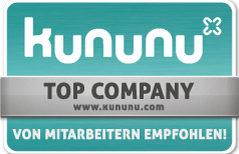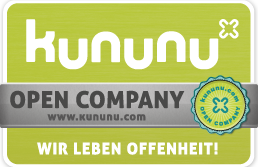7 questions for... Lena Karohs
Bright Minds, Clear Insights
1. How have workflow-based solutions changed your work process?
Lena Karohs: All colleagues are now working on the same topic-based process. This process is optimally organised, planned and implemented – both for our company and for our customers and employees. The work processes are perfectly harmonised.
2. Which processes has the introduction of workflows optimised?
Karohs: Almost all of our processes have been optimised thanks to the introduction of workflows. Initially, we concentrated on the core processes, particularly property management, maintenance, letting, the invoice workflow, annual financial statements and accounting. In the second step, we integrated mobile processes, introduced an app and digitalised the customer communication processes. These measures have made our work processes more efficient and significantly improved cooperation, both internally and with our customers.
3. What long-term advantages do you see in these optimised processes for the future of your company?
Karohs: The optimised processes offer numerous long-term advantages. Our younger employees are used to working in structured and digital environments. This makes it much easier for these young, new colleagues to familiarise themselves with our workflow-based systems. In addition, the digitalised processes enable more efficient management and more effective controlling, which increases the overall productivity of our company. These optimisations enable us to remain more flexible and competitive, promote sustainable corporate development and respond better to the changing needs of our customers.
4. How has your company’s digitisation strategy increased the efficiency of your daily processes?
Karohs: We rely on SAP® as the ERP system for managing our company. Thanks to the PROMOS.GT solution library, we also have access to a large number of customised solutions, features and workflows in SAP®. The system has helped us manage our processes even more clearly. Thanks to various escalation levels, we can recognise potential bottlenecks at an early stage. In addition, tenants can use the app to report damage themselves, which reduces some administrative tasks. These changes have contributed to a measurable increase in our productivity in recent years.
5. Do you have specific examples or data to prove this increase in efficiency?
Karohs: Yes, a key indicator in the housing industry is the number of residential units per employee. At HWS, this figure was 241 dwellings per employee in 2023, while the association average was 113. Before the switch to SAP® and PROMOS.GT, HWS had around 188 dwellings per employee. The figures show that the introduction of the ERP system has had a positive impact on our efficiency.
6. On which processes did the introduction of the ERP system have the greatest impact?
Karohs: The introduction of our ERP system and PROMOS.GT has optimised our central work processes in particular. Invoice processing is now automated and significantly faster, which reduces errors and saves time. Letting residential properties is also more efficient, as rental contracts are managed digitally and communication with prospective tenants is automated. We have also fully digitalised our operating cost accounting, which increases accuracy and improves traceability. These improvements have made our day-to-day work much easier and strengthened teamwork.
7. How important is the digitisation of processes and procedures in your company?
Karohs: Digitisation is a central component of our transformation. Not only does it enable us to map processes digitally, but also to organise them more efficiently. With every new project, we examine how we can integrate digital solutions to improve our work processes. One example is the defect report via our app, which saves both tenants and us time. Digitalisation helps us to be more flexible, increase tenant satisfaction and work sustainably. It is crucial for our future viability and competitiveness.
redaktion@openpromos.de
7 question for...
is dedicated to digital innovations in the real estate industry. How well placed are companies? Which measures are they focusing on? Experts and industry insiders answer questions in brief interviews.
Part 9:
Lena Karohs, Managing Director of Hilfswerk-Siedlung GmbH



